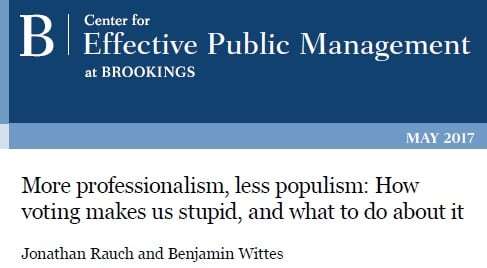The Volokh Conspiracy
Mostly law professors | Sometimes contrarian | Often libertarian | Always independent
Trump, Sanders, Corbyn, Macron and the attack on parties

[I'm delighted that Jonathan Rauch will be guest-blogging today and tomorrow about his new Brookings Institution paper, co-authored with Benjamin Wittes. Jonathan is a senior fellow at the Brookings Institution; contributing editor at National Journal and the Atlantic; recipient of the 2005 National Magazine Award, the magazine industry's equivalent of the Pulitzer Prize; and the author of several books, including "Demosclerosis" and "Kindly Inquisitors: The New Attacks on Free Thought." This is the first of his two posts. - EV]
Why did the voters put Donald Trump, of all people, in the Oval Office? When we ask that question (and we'll be asking it for years to come), we need to make sure not to neglect the simplest yet also most profound form of the answer: Because they could.
Trump hijacked a party to which he did not, in any meaningful sense, belong. (And still doesn't.) In that respect, he expresses a preexisting trend, one which crosses international borders. The institutional power of political parties and professionals is melting away - or, I should more accurately say, being stripped away, because it isn't happening by accident. In France, for the first time, a president was just elected despite not being affiliated with any major party. (He led a self-created, self-styled movement, En Marche, but not an organized party.) In Britain, the Labour Party leader, Jeremy Corbyn, is an unelectable (one hopes) extremist who grabbed control of the party with help of a well-intended but daffy rule allowing anyone who paid three pounds to participate in leadership selection.
Corbyn is likely to be walloped in the British election on June 8, but if he loses, even spectacularly, the Economist reports that he might hold on as Labour leader anyway. Why? "So that he can introduce a vital change in the rules for selecting his successor, reducing the proportion of MPs and MEPs needed to nominate a candidate from 15 percent of the parliamentary party to 5 percent. This would not only increase the chances of Labour's next leader being another hard-leftist but also help to shift control of the party from the MPs to the grassroots." Back here in the United States, followers of Bernie Sanders - the non-Democrat who made a credible run at hijacking the Democratic Party last year - are seeking to eliminate the power of Democratic Party officials and grandees to act as so-called superdelegates, in which role they represent the party establishment in the nominating process.
One of the things parties have done historically, and their most important single function and prerogative, is to serve as gatekeepers and gardeners in the process of choosing who runs for office. As gatekeepers, they block sociopaths, disrupters, extremists and others who would, if elected, obstruct the task of governing and tarnish the party's brand. As gardeners, they identify and nurture political talent, by spotting people with talent, encouraging them to run and providing material and organizational support. In both roles, they ensure that politicians, in office, owe something to each other and to the party - which, in turn, helps to prevent the kind of hyper-individualistic political chaos that House Speaker Paul Ryan (for instance) finds himself contending with right now.
And here's the important thing: No other organization in American life can reliably play the parties' vetting role. Not interest groups. Not activists. Certainly not the voters.
Once upon a time, party gatekeepers would have slammed the door on Trump, when they possessed the power to do so. They might have bought him off with the offer of some other job, or they might have mobilized a coalition against him, or they might have found ways to keep him off the ballot, but they would have prevented him from reaching the cockpit and stealing the plane, because that was their job. As we saw, in 2016 they were helpless.
Corbyn, a screwball, is too close to power for comfort. Emmanuel Macron is an appealing and responsible figure, but how can he govern without a party? And how responsible will the next lone-ranger French president be, now that party backing is optional?
What we are learning today (relearning, because the Founders warned us) is that voters, like all consumers, make better choices when presented with better options. And when presented with options that are untested, unpredictable, unstable or unsafe - well, no guarantees.
Here are three propositions. Together, they form the basis of "political realism," the idea that parties and machines and backroom dealmaking are essential to the task of organizing politics and that idealistic efforts to dismantle them have backfired.
First, the demotion and disempowerment of political intermediaries such as political parties and professionals - otherwise known as machines and hacks - have proved damaging, possibly catastrophic, for democratic governance. That's the subject of this monograph.
Second, disintermediation happened largely on purpose, as a result of decades' worth of well-intentioned but misguided reforms that attempted to broaden and equalize political participation. That's the subject of this article.
Third, people who are worried about the future of democratic governance in America (and elsewhere) need to redirect their energies away from populist-inspired efforts to give ordinary people more voice. Instead, they need to focus much more on re-empowering our neglected and beleaguered political institutions, before it's too late.
That last proposition is the subject of a new Brookings Institution paper by Benjamin Wittes and me. More about our findings tomorrow.


Show Comments (0)